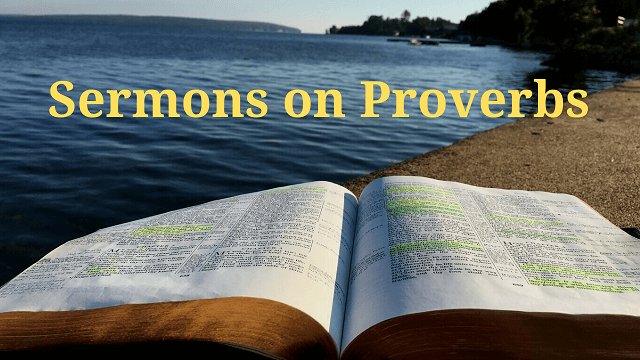Proverbs (Part 127) - Pro 10:15
Submitted by Pastor Chad Wagner on Wednesday, July 6, 2022.


15. Pro 10:15 – "The rich man's wealth is his strong city: the destruction of the poor is their poverty." A. The rich man's wealth is his strong city: i. This phrase is repeated twice in Proverbs, emphasizing its importance (Pro 18:11). ii. A strong city is a place of protection and provision. a. A strong city is fortified and well supplied with food and weapons (2Ch 11:11-12). b. Strong cities are hard to defeat (Pro 18:19). c. Tyre was a strong city (Jos 19:29) which was known for its wealth and commerce (Isa 23:1, 3, 8; Eze 27) and its strongholds (Isa 23:11; Eze 26:4, 12). iii. The rich man's wealth is a high wall of protection in his own mind (Pro 18:11). iv. The wealthy trust in their riches to protect them and provide for them instead of God (Psa 52:7). a. They think that their riches and possessions will last forever (Psa 49:6, 11). b. Their wealth will not save them from death (Psa 49:7-10, 12-14), nor will it go with them to the next world (Psa 49:16-17). c. Trusting in their riches will cause them to fall rather than be established (Pro 11:28). v. It's not wrong to have riches, but we must never trust in them, but rather we must only trust in God (1Ti 6:17). vi. The Lord is our strong city/tower wherein is found true protection, provision, and peace (Pro 18:10; Psa 31:19-24; Isa 26:1-4; Psa 61:1-4). B. the destruction of the poor is their poverty. i. Poverty is destructive and reduces the poor to a very low condition. a. Poverty n. – 1. a. The condition of having little or no wealth or material possessions; indigence, destitution, want (in various degrees: see poor a. 1). b. Poor adj. – I. 1. a. Having few, or no, material possessions; wanting means to procure the comforts, or the necessaries, of life; needy, indigent, destitute; spec. (esp. in legal use) so destitute as to be dependent upon gifts or allowances for subsistence. In common use expressing various degrees, from absolute want to straitened circumstances or limited means relatively to station, as ‘a poor gentleman’, ‘a poor professional man, clergyman, scholar, clerk’, etc. The opposite of rich, or wealthy. c. Destruction n. – 1. The action of demolishing a building or structure of any kind, of pulling to pieces, reducing to fragments, undoing, wasting, rendering useless, putting an end to, or doing away with anything material or immaterial; demolition. d. Poverty destroys like an armed attacker (Pro 6:11). ii. Poverty puts the poor in a condition which requires pity and mercy from others. a. The poor cry out for help (Pro 21:13). b. The poor need mercy (Pro 14:21; Pro 14:31). c. The poor are the object of pity (Pro 19:17). iii. Poverty puts the poor in a position of weakness which makes them vulnerable to attacks which cause destruction. a. The poor are targets of robbers which will bring them destruction (Pro 22:22). b. They are even oppressed by other poor people which leaves them with nothing (Pro 28:3). c. The poor get devoured by wicked people (Pro 30:14). d. Wicked rulers tyrannize the poor because they cannot resist them (Pro 28:15; Ecc 5:8). iv. Poverty destroys social relationships. a. The poor are hated by their neighbors (Pro 14:20). b. Neighbors will separate from and exclude the poor (Pro 19:4). c. The poor are even sometimes hated by their own family and forsaken by their friends (Pro 19:7). v. Poverty invites oppression and ridicule which are destructive. a. The poor are often the target of oppression (Pro 14:31; Pro 22:16). b. The poor are often mocked (Pro 17:5). vi. Poverty can cause a man to steal which will bring him judgment from God and further financial destruction (Pro 30:7-9 c/w Pro 6:30-31). vii. Poverty brings misery (Pro 31:7). viii. Brethren, listen to and heed the sound instruction you have received over the years on money management and a Biblical work ethic to avoid poverty and the destruction it brings (Pro 13:18).
| Attachment | Size |
|---|---|
| Proverbs (Part 127) - Pro 10.15, 7-6-22.mp3 | 29.9 MB |
